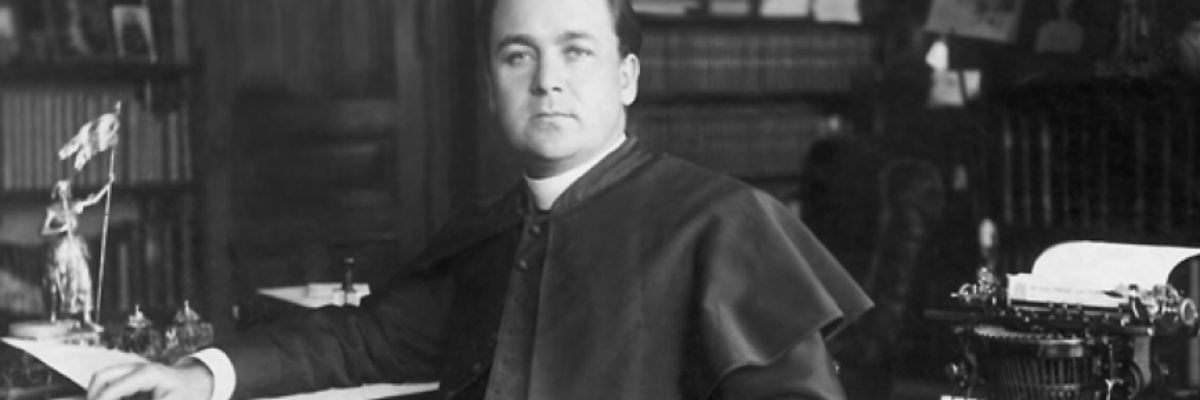
Prince Edward Island is best known to Americans as the setting of the Anne of Green Gables novels and the birthplace of the author, Lucy Maude Montgomery. Prince Edward Island is also the birthplace of one of the greatest bishops in the history of the Church in America, Francis Clement Kelley (1870-1948), founder of the Catholic Church Extension Society and second bishop of Oklahoma. From the first he excelled at writing and, after becoming a Catholic priest, would go on to publish 17 books.
Ordained a priest for the diocese of Detroit, Michigan, Fr. Kelley’s first assignment set the spark to the tinder that fired his life’s work. The Lapeer, Michigan, parish to which he was assigned “spoke of a cold calculating indifference to God.” The culprit was the previous pastor, removed for apostasy. The 23-year-old Fr. Kelley rallied his disillusioned parishioners with sermons rich in doctrine and delivered with clarity and wit. Kelley initiated a building project that stalled in 1898 while the young priest donned his country’s uniform for the ten-week Spanish-American War.
“No one could have had a stronger conviction that the war with Spain was not only unjust but unnecessary,” Kelly later wrote, but as an Army chaplain he was able bring the sacraments to soldiers mired in the tropical heat, bad sanitation, snakes, mosquitoes, and fever of the U.S. Southeast.
Writer and apologist
Returning to Michigan, Fr. Kelley joined the Lyceum circuit, and his honoraria funded the construction needs of his parish. His audiences ranged from “small boys throwing peanut shells” to “old ladies who looked with disapproval at the first Catholic priest they had ever seen while wondering how he concealed his horns so cleverly.”
Fr. Kelley came face to face with Middle America gathered in meeting halls, red schoolhouses, vacant shops, and tents. He witnessed the miserable living and working conditions endured by Catholic priests “among the scattered people and the churchless places” of the American West and South. He resolved to found a home mission society to bring the Faith to the many regions of America overrun with poverty, prejudice, and ignorance.
A column for the Ecclesiastical Review of Philadelphia launched the Catholic Extension Society. Reprinted as a pamphlet, Kelley’s “Little Shanty Story” described the ramshackle rectory of a Catholic pastor in Ellsworth, Kansas. The pamphlet captured the hearts of Catholics across the Republic, and in poured donations. One captured heart was that of Archbishop of Chicago, James Quigley. Within a year Kelley’s bishop gave him the exeat to transfer to Chicago where the Catholic Church Extension Society had been formed shortly before.
Kelley excelled as a fundraiser, but his public candor about the lack of missionary spirit in the American seminaries and his scathing criticism of the American hierarchy’s neglect of Catholic rural America made him enemies on the East Coast, including the papal delegate, Archbishop Diomede Falconio. Quigley stuck by Kelley and arranged meetings for him in Rome to obtain Vatican approval for the Society.
To Kelley, Pope Pius X was “a saint who saw no obstacle to holiness in the possession of a fund of humor.” But it was the pope’s Secretary of State, Cardinal Merry del Val, who was “the first great and powerful Roman friend of the Extension Society.” He instructed Kelley “in the science of untying hard diplomatic knots,” lessons the priest would apply throughout his life. Del Val secured a papal brief of approval for the Extension, largely silencing Kelley’s critics.
Apologetics was central to the work of the Extension Society, and when a chapel car rolled into town, one especially popular feature was (then as now) the question box. Before a priest of the Extension would deliver a lecture or offer Mass, he would field questions about the Catholic Faith, often from Protestants or Mormons.
Some questions derived from innocent ignorance: one woman thought that Jesus Christ had brought the Bible down from heaven, whole and entire. Other questions were the result of the Ku Klux Klan’s anti-Catholic propaganda: “Is it true that a priest has to murder four people before he can be ordained?” “Do priests really have hooves like cows instead of feet?” A priest visiting a town in Oregon took off his shoes and socks to settle the matter.
Fr. Kelley’s rolling chapels restored the sacraments to countless fallen-away Catholics all over rural America. Extension Society priests offered the sacraments and the Mass throughout the West, Midwest, and the South. In the many towns where the rail cars planted the seed of the Faith, chapels and churches sprang up, supported by Extension Society dollars and constructed by the faithful who had returned home to the Church.
Kelley helped finance the work of the Extension with his Extension Magazine, which at its peak boasted half-a-million subscribers. A Catholic version the Saturday Evening Post, the quarterly spread the word about the Society’s work, thereby attracting donations. Extension Magazine also included articles in apologetics, poetry, and short stories, including scores of mystery stories penned by Kelley himself.
Books to politics
So popular was Extension Magazine that when America entered the First World War, Kelley received the offer of a substantial bribe in exchange for an editorial endorsing Woodrow Wilson’s interventionism. Kelley declined, passing up “his one and only chance to become rich” and penned instead The Pigs of Serbia, a scathing rebuke of the war and its promoters on both sides of the Atlantic.
American meddling in the affairs of Europe was not the only U.S. foreign policy that provoked Fr. Kelley’s anger. “The Mexican Question,” mishandled by administrations from Taft’s to Coolidge’s, became a focus of Kelley’s life and perhaps the one for which he is best known today. The resulting book, Blood Drenched Altars, is his only work still in print. The volume argues that Mexico under Spain was a glorious Catholic country, culturally superior to the United States well into the nineteenth century: “They dotted the land,” wrote Kelley, “with architectural triumphs which to this day have not been equaled in the Americas.”
Fr. Kelley’s fight for the soul of Mexico took him to the corridors of American power, striking up dramatic conversations with Secretary of State William Jennings Bryan and a meeting with Wilson himself about American’s unwillingness to get involved in the atrocities in Mexico.
The diplomat and bishop
After the First World War, Fr. Kelley took his crusade for the Church in Mexico to Versailles, where he proposed a “liberty of conscience” requirement for any nation desiring membership in the League of Nations. Kelley’s amendment was not a theological proposition but a matter of practical politics, and a wise one. Yet, as he later observed, at the modern world’s official gathering of liberalism, a chief tenet of liberalism, religious freedom, was given no quarter, scuttled by Wilson and French prime minister Georges Clemenceau.
The time in Paris did bear fruit. Kelley used his skills in practical diplomacy to help achieve a just resolution of the “Roman Question.” The Vatican had lost its lands and sovereignty in the Italian revolution. Kelley proposed a territorial concession, access to the sea, and recognition of sovereignty. Ten years later, the substance of Kelley’s plan was approved by Mussolini, and the sovereignty of the Holy See was restored and secured.
In June 1924, the man who had been a sailor, soldier, scholar, orator, mission priest, political adept, international diplomat, and published author with a prose style praised by H.L. Mencken was ordained the second bishop of Oklahoma. The mission priest was now a mission bishop, establishing the Faith on the plains and bringing a new diocese to maturity.
Francis Kelley’s life shows how dogged determination, a devout prayer life, and a profound humility can achieve great things for God. “The thing was God’s, not mine,” he wrote. “If he wanted a fool or a child to do it, that was his business. He had his way of picking over poor material and working it over to suit his purposes. I was quite sure that I was poor material. But why worry? The skeleton of a failure often marks the beginning of a right trail.”
Bishop Francis Kelley was far from a failure, but he did understand what St. Teresa of Calcutta would later observe: “We are not called to be successful; we are called to be faithful.”



